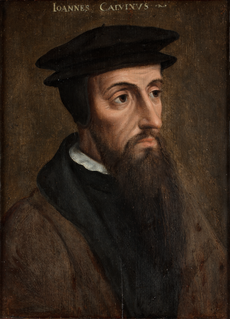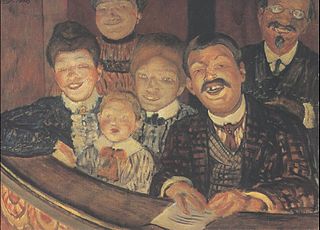
Geneva is the second-most populous city in Switzerland and the most populous city of Romandy, the French-speaking part of Switzerland. Situated where the Rhône exits Lake Geneva, it is the capital of the Republic and Canton of Geneva.

John Calvin was a French theologian, pastor and reformer in Geneva during the Protestant Reformation. He was a principal figure in the development of the system of Christian theology later called Calvinism, aspects of which include the doctrines of predestination and of the absolute sovereignty of God in salvation of the human soul from death and eternal damnation, in which doctrines Calvin was influenced by and elaborated upon the Augustinian and other Christian traditions. Various Congregational, Reformed and Presbyterian churches, which look to Calvin as the chief expositor of their beliefs, have spread throughout the world.

Henry Dunant, also known as Henri Dunant, was a Swiss humanitarian, businessman and social activist. He was the visionary, promoter and co-founder of the Red Cross. In 1901 he received the first Nobel Peace Prize together with Frédéric Passy, making Dunant the first Swiss Nobel laureate.

In theatre, a farce is a comedy that aims at entertaining the audience through situations that are highly exaggerated, extravagant, and thus improbable. Farce is also characterized by physical humor, the use of deliberate absurdity or nonsense, and broadly stylized performances. It is also often set in one particular location, where all events occur. Farces have been written for the stage and film.

The Republic and canton of Geneva is the French-speaking westernmost canton or state of Switzerland, surrounded on almost all sides by France (Auvergne-Rhône-Alpes). As is the case in several other Swiss cantons, this canton is referred to as a republic within the Swiss Confederation.

Sérgio Vieira de Mello was a Brazilian United Nations diplomat who worked on several UN humanitarian and political programs for over 34 years. The Government of Brazil posthumously awarded the Sergio Vieira de Mello Medal to honor his legacy in promoting sustainable peace, international security and better living conditions for individuals in situations of armed conflict, challenges to which Sergio Vieira de Mello had dedicated his life and career.

The University of Geneva is a public research university located in Geneva, Switzerland.
The year 1891 in architecture involved some significant architectural events and new buildings.

The Eurovision Young Musicians 1984 was the second edition of the Eurovision Young Musicians, held at the Victoria Hall in Geneva, Switzerland on 22 May 1984. Organised by the European Broadcasting Union (EBU) and host broadcaster the Swiss Broadcasting Corporation, musicians who could be no older than 19 years of age, from seven countries participated in the televised final hosted by Georges Kleinmann. They were all accompanied by the Roman Swiss Orchestra, conducted by Horst Stein. Finland and Netherlands made their début, while Norway withdrew from competition.

Marc Camoletti was a French playwright best known for the farce Boeing-Boeing.
Marc Camoletti may refer to:
Events from the year 2003 in France.
Events from the year 1923 in France.

Victoria Hall is a concert hall located in downtown Geneva, Switzerland. It was built in 1891–1894 by the architect John Camoletti and financed by the consul of England, Daniel Fitzgerald Packenham Barton, who dedicated it to Queen Victoria and gave it to the city of Geneva. Currently, the hall is used mostly for classical-music performances.
Thierry Beccaro is a French stage actor and TV presenter, with an Italian grandfather and Breton origin from his grandmother. He has a sister, younger by four years. He was primarily known to the general public as the presenter of TV game Motus on France 2 (1990-2019).

The Geneva Conventions comprise four treaties, and three additional protocols, that establish the standards of international law for humanitarian treatment in war. The singular term Geneva Convention usually denotes the agreements of 1949, negotiated in the aftermath of the Second World War (1939–1945), which updated the terms of the two 1929 treaties, and added two new conventions. The Geneva Conventions extensively defined the basic rights of wartime prisoners, established protections for the wounded and sick, and established protections for the civilians in and around a war-zone. The treaties of 1949 were ratified, in whole or with reservations, by 196 countries. Moreover, the Geneva Convention also defines the rights and protections afforded to non-combatants. The Geneva Conventions are about soldiers in war; they do not address warfare proper—the use of weapons of war—which is the subject of the Hague Conventions, and the bio-chemical warfare Geneva Protocol.

Marie-Georges Pascal was a French film, television and theatre actress.

The Musée d’Art et d’Histoire is the largest art museum in Geneva, Switzerland.

Events from the year 1555 in France.
Pierre Camoletti is a Swiss sailor. He competed in the Dragon event at the 1960 Summer Olympics.
This page is based on this
Wikipedia article Text is available under the
CC BY-SA 4.0 license; additional terms may apply.
Images, videos and audio are available under their respective licenses.













